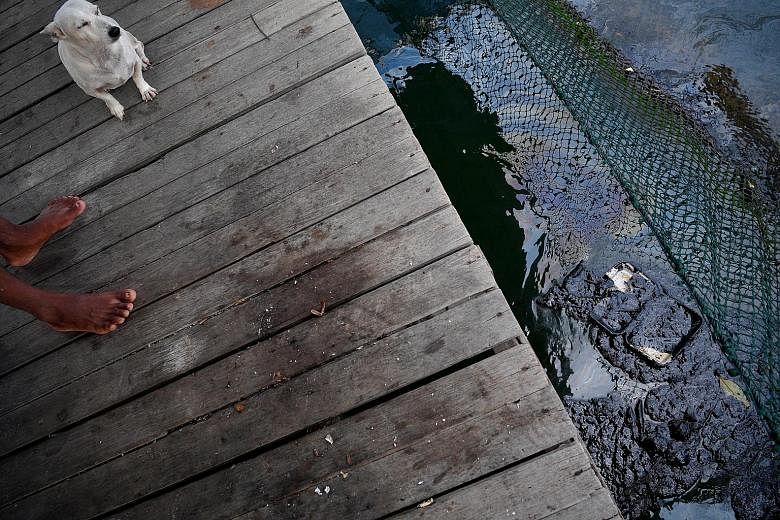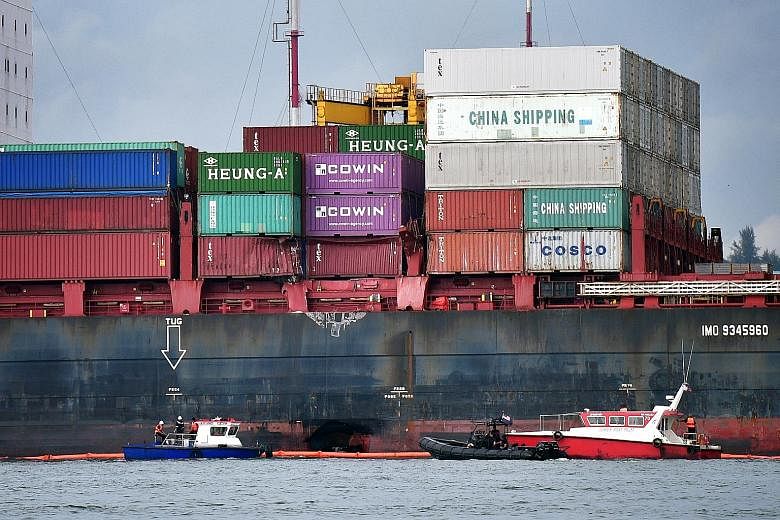An oil spill that occurred off Pasir Gudang Port in Johor on Tuesday night has affected three coastal fish farms near Pulau Ubin and left nature enthusiasts concerned about the potential impact on wildlife in the area.
A spokesman for the Agri-Food and Veterinary Authority (AVA) told The Straits Times yesterday that one farm had reported losing between 100kg and 200kg of fish.
"We have issued oil-absorbent pads and canvases to 11 farmers closest to the oil spill site to help protect their fish stock," said the spokesman.
On Tuesday night, a Singapore- registered container vessel, the Wan Hai 301, collided with the APL Denver, a Gibraltar-registered container vessel, off the Johor port.
The incident occurred close to midnight and left 300 tonnes of oil spillage as a result of damage to one of the APL Denver's bunker tanks.
Oil patches were also found along the western coastlines of Pulau Ubin (OBS Jetty) and Nenas Channel, said the Maritime and Port Authority of Singapore (MPA).
"The two oil patches are mainly contained and no new sightings of oil have been reported," added the MPA yesterday.
Coastal fish farmers in the East Johor Strait were alerted, said the AVA spokesman. Farmers were advised to stop feeding their fish and to use canvas skirting to prevent oil from contaminating fish stocks.
Yesterday, remnants of oil could still be seen in the waters off Pulau Ubin. Fish farmers told The Straits Times it had got into their fish nets.
One of the farmers, who wanted to be known only as Mr Ho, said he was worried that the fish would be affected as he had fed them earlier in the day. To eat, the fish would have gone up to the surface, which was contaminated by oil.
"Let's just hope the fish won't die. We have been harmed by the red tide in the last few years, and now we have an oil spill," said the 55-year-old, referring to the algae blooms that had plagued the area.
As a precautionary measure, fish samples have been collected from the farms for food safety tests.
There are about 60 farms located in the East Johor Strait, most of which provide fish for Singaporeans' consumption.
Dr Huang Danwei from the National University of Singapore's Department of Biological Sciences said oil spills can be devastating for marine life, not just in how widely they spread, but also in the amount of time they take to be cleaned up.
"On the water, oil floats and can coat anything that moves through it. Sea otters and seabirds, for example, are large animals that are most affected because their fur and feathers lose their functions upon contact with oil," said Dr Huang.
He added that the Asian small- clawed otter, which is rare in Singapore, is known to live in the mangroves of Pulau Ubin.
The National Parks Board said yesterday that the spillage had been contained off the northern and western parts of Pulau Ubin.
As the tide was expected to move eastwards yesterday night, oil-absorbent booms were set up to protect the mangroves and mudflats along the north-eastern coast of Pulau Ubin, including the Chek Jawa Wetlands. Booms to contain the oil spill have also been set up to protect the mangroves at Coney Island Park and Pasir Ris Park.
Since 2012, there have been six Singapore-registered vessels involved in collisions that caused casualties or oil spills, including the latest incident.
The MPA and its contractors deployed nine vessels to respond to the oil patches at OBS Jetty and Nenas Channel. The cause of the collision is under investigation.
Singapore's last major oil spill happened in May 2010, when a collision caused 2,500 tonnes of crude oil to be leaked into the Singapore Strait.
According to the New Straits Times, the incident on Tuesday reportedly occurred when the vessel, Wan Hai, suffered a power failure, causing it to become uncontrollable before it hit the APL Denver.



